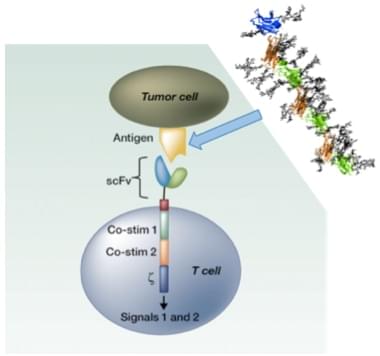All products and services are For Research Use Only and CANNOT be used in the treatment or diagnosis of disease.
Target Background
Carcinoembryonic antigen (CEA) is a 180-KD cell surface glycoprotein and considered as one of the most characterized human tumor-associated antigens. CEA is normally found in fetus, and then the level of CEA continually decreases after birth. CEA is highly expressed in a wide range of carcinomas including NSCLCs, breast, and ovarian, gastric, pancreatic and endometrial cancers.
Anti-CEA CAR-T Cell Therapy
Preclinical studies demonstrate that anti-CEA CAR-T cells can effectively target CEA expressed in colorectal adenocarcinoma and pancreatic tumor. Several Phase I clinical trials are being conducted to evaluate the efficacy of engineered anti-CEA CAR-T cells in patients with CEA positive cancers (NCT00004178, NCT02349724, NCT00923806, NCT02416466 and NCT01869166). Preliminary data indicates that anti-CEA CAR-T cells can significantly reduce serum CEA level and induce remission of tumor metastasis to other organs such as lung and liver. However, the current therapies remain risky due to observed toxicity that results in transient colitis (NCT00923806).

Animal Models for in vivo Study of anti-CEA CAR-T Cell Therapy
Creative Biolabs has established various in vivo tumor models and our technical team has extensive knowledge and experience to conduct CAR-T cell evaluation. All animal experiments are monitored under an approved Institutional Animal Care and Use Committee (IACUC).
Xenograft model of pancreas carcinoma
CEA positive pancreatic carcinoma cells Panc02 are transfected with plasmid-encoding human CEA. Pancreas carcinoma model is established by intrapancreatic injection of CEA+ Panco2 into immune-compromised mice. When tumor sizes reach certain criteria, anti-CEA CAR-T cell are given and close observation are followed. We also provide CEA and click beetle luciferase co-expressed Panc02 cells for in vivo bioluminescence monitoring. Considering previous reports that CEA is not very tumor-selective, Creative Biolabs offers immune-competent mice expressing CEA transgene in intestinal and pulmonary tissues for safety evaluation.
Xenograft model of colorectal carcinoma model
NOD mice are subcutaneously injected with LS174T human Colon carcinoma cells, followed by intravenous injection of anti-CEA CAR-T cells and pathological monitoring.
In vivo Assay Parameters and Techniques
Creative Biolabs offers comprehensive services to test anti-CEA CAR-T cell therapy in preclinical tests. All tests are conduct by well-trained technicians and strike to milestone of timeline.
Efficacy Tests
Tumor remission monitored by tumor volume recording or bioluminescence imaging and survival curve tracking.
Viability and Bio-distribution Studies
Durability and bio-distribution are evaluated by bioluminescence imaging, immunochemistry staining and real-time PCR
Toxicity Evaluation
Pilot tolerated evaluation: route of administration, dosage, MTD
Clinical observation: body weight, food consumption, behavior and pathological signs
Cytokine storm surveillance (fever, hypertension, prolonged cytopenia)
Postmortem analysis
Tumorigenicity study
GLP-Compliant Preclinical Test
All our experiments are performed by well-trained and experienced technicians in a GLP-compliant and IACUC-regulated facility.
Creative Biolabs fully understands researches of adoptive T cell therapy targeting CEA are time-consuming and costly. With our highly experienced technical groups and state-of-the-art facilities, we would like to accelerate these studies by providing our top-quality in vivo tumor models and efficient analyzing services.
References
For any technical issues or product/service related questions, please leave your information below. Our team will contact you soon.
 NEWSLETTER
NEWSLETTER
The latest newsletter to introduce the latest breaking information, our site updates, field and other scientific news, important events, and insights from industry leaders
LEARN MORE NEWSLETTER NEW SOLUTION
NEW SOLUTION
CellRapeutics™ In Vivo Cell Engineering: One-stop in vivo T/B/NK cell and macrophage engineering services covering vectors construction to function verification.
LEARN MORE SOLUTION NOVEL TECHNOLOGY
NOVEL TECHNOLOGY
Silence™ CAR-T Cell: A novel platform to enhance CAR-T cell immunotherapy by combining RNAi technology to suppress genes that may impede CAR functionality.
LEARN MORE NOVEL TECHNOLOGY NEW SOLUTION
NEW SOLUTION
Canine CAR-T Therapy Development: From early target discovery, CAR design and construction, cell culture, and transfection, to in vitro and in vivo function validation.
LEARN MORE SOLUTION